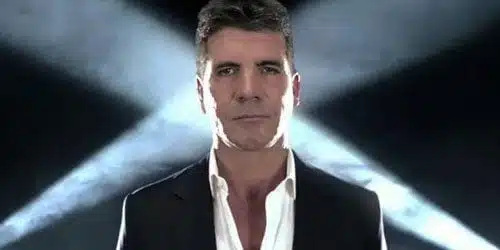
The big deal about Simon Cowell’s new singing competition show The X Factor is that he walked away from that other singing competition show to produce it. It’s also a big deal that they’re both on Fox, as well as Sony’s putting up a sweet $5 million recording contract for The X Factor’s winner — the largest reality show cash prize ever.
Like most big deal reality competition shows, The X Factor features plenty of mobile camerawork and intercut footage to remind us all what’s at stake: Cowell’s professional reputation and Sony’s money. Oh, and hundreds of thousands of common people’s dreams.
And this is the formula, so reductive and so colossally successful: even as you might want to see that brutally honest bitch Cowell fail miserably, the high drama, your investment, is found in the legions of pop star hopefuls who line up to audition for him. The X Factor like all these shows, begins with footage of thousands of auditioners (in LA alone, they saw 20,000!), most never seeing the actual judges’ table or a proper stage.
Of the select few who do, even fewer get the privilege of on-air backstories, designed to generate interest in promising contestants early on. These sequences include the usual “I want this so bad” testimonials. What makes The X Factor’s take on this format unique is the inclusion of interactions that aren’t scripted or even contrived: walking down the backstage corridor with family members or a candid (albeit miked) moment in a waiting area that illuminates that contestant’s personality in a way that seems authentic, even if it’s not. In reality TV, seeming authentic is as good as being authentic.
That blurring of what’s real and what’s not underlines that very little is left to chance on The X Factor. As on so many of these shows, it’s hard to say why or how the really rotten auditioners find their way before the judges. Perhaps they’ve been put up to their over-the-top performances by producers, perhaps they’re simply looking for attention, but their inauthenticity is made more glaring when set against so many genuine (-seeming) emotional experiences. The people who have come to The X Factor with a dream far outnumber those looking for their 15 minutes, and they are largely treated with tenderness and respect, or at least as much as can be delivered in this context.
Take Rachel Crow, a 13-year-old who lives in a two-bedroom house with her six super-supportive family members. Her effervescence and pluck see her through a rendition of Duffy’s “Mercy” that gets the audience up and dancing, even if she’s off-key. Or the 43-year-old single mother of two small children, who, wheeling her babies in with her to register to audition, sees this as her last best shot so that she doesn’t “die with this music in me.” It’s hard to imagine that anyone could see such a long shot as her best one — that is, until you hear her sing.
I know this because I attended a taping of The X Factor in Seattle, during which I watched several performers bomb and several more make it on to the next round (a contestant needs three of the four judges’ approval to move forward). And while I found myself cheering and clapping and even rising out of my chair during several strong performances, I was far more emotionally invested in watching those same performances on the small screen than I was able to muster in person.
Editing helps, certainly. And The X Factor‘s editing isn’t too conspicuous. It doesn’t resort to too many instructive glances or faux tension-building long shots that typically spell insufferable reality show disaster. The X Factor strives to feel “real” in a way that other singing competition shows have obviously failed. Though, it’s clear the producers vetted auditioners down to those who would either blow the judges away or horrify everyone in the arena. Middling talent tends not to make its way to the stage. Sure, the show wants to find a star and all that, but it’s got to be good TV too.
And The X Factor really is good TV. While all of the judges — L.A. Reid, Nicole Scherzinger, Paula Abdul, and Cowell — struggle to explain that indescribable thing they’re looking for, record producer Reid comes closest when he says that he wants to have his “spirit moved and the hairs on the back of his arm to stand up.” The X Factor is one reality competition show that delivers that experience to its home audience also. At least on this show, when Paula’s moved to tears, so are you.

